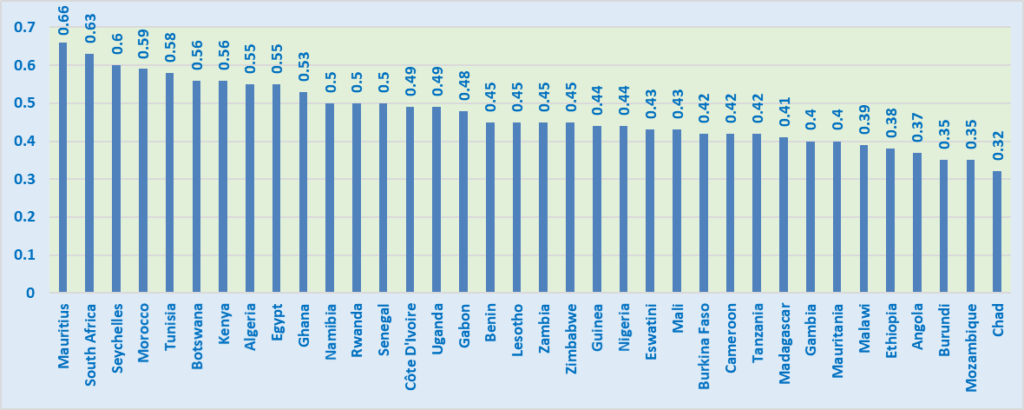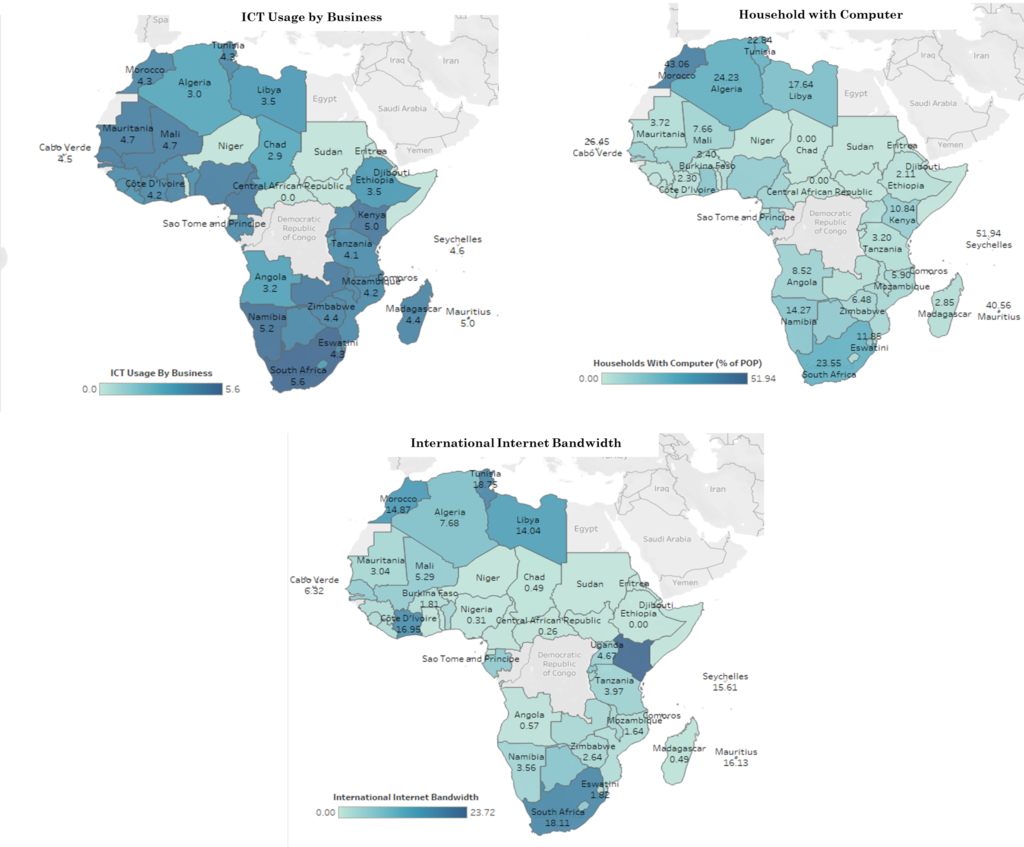Digital innovations are advancing at a rapid pace, connecting businesses, individuals, governments around the world and creating exciting opportunities. These opportunities provide numerous benefits and major gains in terms of structural transformation for the majority of economies. However, African economies are yet to benefit from these opportunities.
The global digital market is generally uneven and imperfect, with African countries contributing little to the market’s value creation. For example, in 2017, ICT export from Africa stood at approximately four percent globally. Also, accessibility to the internet remains minimal in Africa, with about 47 percent of the continent’s population having access, compared to a global average of 63 percent. The issue of digital skills shortages, high-cost structures and deficits in ICT infrastructure are also among the key challenges facing Africa’s digital economy. As a result, it is estimated that most African countries are poorly prepared to capitalize on global digitalization.
Since many African economies continue to struggle with institutional and structural challenges that impede digital adoption and growth, the economic benefit of digitalization remains disproportionate — concentrated in a few comparatively better-off economies. Closing this digital gap is crucial for preventing many African countries fromfalling behind in the digital space.
Understanding the level of digital preparedness and development across various facets of African economies is the starting point for developing suitable intervention policies. Hence, the Centre for the Study of the Economies of Africa (CSEA) has developed a series of indicators for tracking African countries’ digital preparedness, digital development, and data governance regulations. This is known as the Digital Governance Portal.
The Digital Governance Portal has a user-friendly interface that makes it simple to navigate. In addition, datasets and methodology notes are open to the public for download in excel and portable document format. The Portal allows users to visualize digital and data governance indicators over a period, gain access to presentation-ready maps and conduct comprehensive analysis on national and regional levels.
The Digital Governance Portal
The Digital Governance Portal, a one-of-a-kind portal about the African digitalization space, collects data on digital indicators from a variety of sources. It demonstrates how African countries have advanced in their digital transformations. The Digital Governance Index reflects the trajectory towards building an inclusive digital economy and serves as a resource for policymakers. The Portal is built on three pillars that capture African digital evolution and progress.
First is the Digital Preparedness pillar, which measures an economy’s readiness to transit to a digitized world, which is facilitated by improved digital skills, ICT infrastructure and business dynamism. This pillar assesses a specific set of indicators (education, infrastructure, business, regulatory and macroeconomic) that make it easier for a country to integrate, apply, and develop digital technologies locally and within the global value chain that revolves around the ICT sector. The second pillar is Digital Development, which provides specific digital indicators on the depth of development of the country’s digital space.
Among the indicators covered in this pillar are the e-government index, the ICT development index, and the proportion of households with access to the internet and computers. Finally, the Data Governance pillar describes the processes, laws, and regulatory framework available for managing the availability, usability, transfer, integrity, and security of the digital space within a country. On each pillar, users have access to statistics on several sub-components from over twenty individual sources covering 38 African economies.
Figure 1: The Digital Governance’s Pillars

Zoom in on the Digital Preparedness Pillar
The summary of African countries performance on the Digital Preparedness pillar is summarized in Figure 2. The highest ranked country is Mauritius with a score of 0.66, while Chad has the worst performance with a score of 0.32. The average score on the Digital Preparedness Index among African economies is 0.47. No country obtained a perfect score of 1 on the Digital Preparedness Index. There are 54 African countries, however, from the data on the digital preparedness index, data is only available for 36 countries which can be viewed on the chart below.
Figure 2: Digital Preparedness in Africa

Zoom in on the Digital Development Pillar
The Digital Development Indicator shows that only 11 percent of African households have access to a personal computer. Also, Africa has an average speed of 6.09 kilobit per second of International Internet bandwidth. In relation to the extent to which businesses in Africa use ICTs for transactions with other businesses, Africa has an average of 4.13 points out of 7 points, indicating an average performance. Also, the heat map (See Figure 3) indicates a strong ICT usage by businesses in West Africa and Southern Africa economies than in other regions.
The top countries in terms of access to digital technologies are Seychelles (52%), Morocco (43%), and Mauritius (41%). In addition, Kenya, Tunisia, and South Africa are the top African economies with the fastest international internet bandwidth of 23.72kb, 18.75kb, and 18.11kb, respectively. Again, the information elicited from the data points to a few top-performing countries and large underperforming countries, which is a pointer to a high digital divide similar to those observed between developed and developing countries.
Figure 3: Digital Development in AfricaSource: Centre for the Studies of Economics of Africa

Source: Centre for the Studies of Economics of Africa
Zoom in on the Data Governance Pillar
On the Data Governance pillars, 61 percent (33) of African countries have legislation on privacy and data protection. A similar regional approach to data privacy, the Malabo Convention, has only been ratified by 7 countries. Also, only 33 out of 54 African economies have existing legislation on electronic transactions, and 46 per cent have laws regarding consumer protections. Data governance is the core instrument to deliver sustained and robust digital development, yet the data from the Digital Governance Index point to Africa’s modest progress in these areas. The preceding analysis points to the diagnostic and descriptive power of the Digital Governance Platform to policymakers and other stakeholders in Africa.
Figure 4: Data Governance in Africa

How To Galvanize Digital Development in Africa
Statistics from the three pillars (Digital Preparedness, Digital Development, and Data Governance) suggest that Africa still lags and needs to intensify efforts to improve its digital economy. In Africa, digitization opportunities are limited in a variety of ways. Some are the result of deficiencies in digital infrastructure and digital skills, while others are how the digital economy is controlled. Considering these issues, policymakers and stakeholders in the digital economy must collaborate to make decisions that can harness the potential of digitalization to spread its benefits more equitably and empower the economy to combat rising inequalities. To remedy this, governments and policymakers can prioritize digital skill development in their various countries. Evidence suggests that there is a strong need to develop such relevant skills and other related competencies for the African economies to participate actively in the digital economy.
It is also critical to strengthen digital infrastructure. So far, the scope and pace of the direct benefits of improved access to the Internet and related digital technologies on local economic development in most African nations have been modest. Therefore, it is critical to provide access to steady Internet in digitally-enabled sectors in order to support more value creation in the digital economy. Similarly, collaboration and investment partnerships with more advanced digital economies and private sector actors will provide Africa with access to capital and digital technicalities/resources for long-term digital infrastructure development.
Developing and implementing a legal regulatory framework for digital space control is essential. Unfortunately, many African economies lack the regulatory environment required to support digital development. A good starting point would be to initiate a regulatory gap assessment, which would constitute the basis for a comprehensive approach to formulating laws and regulations for the digital economy, and then incorporate baseline digital legislation or update relevant regulations in accordance with global best practices.
Finally, boosting techpreneurs will act as a driver for digital economy growth in Africa. Gaining the most out of the digital economy involves strengthening the digital sector and initiatives that allow businesses from all sectors to take more advantage of digital technologies. In many African economies, the usage of ICTs by businesses, particularly micro and small businesses, is still minimal. With rising levels of digitization in several sectors, including agriculture, energy, health, e-commerce, and electronic payment, techpreneurs have a lot of potential to develop innovative digital solutions for those sectors. Firms that invest in and use digital technologies are more productive, innovative, and lucrative.
Final Remarks
Digital development could be the game-changer for the African continent. It has the potential to boost economic development and industrialization while also improving the business environment and alleviating poverty. Thus, Africa’s digital economy must improve. To improve the performance of the African digital economy and maximize the potential of digitalization, governments, policymakers, and key stakeholders should collaborate to establish soft/hard digital infrastructure as well as a favourable regulatory environment for private sector investments and data protection.
Beyond policy collaboration, the CSEA’s Digital Governance Portal will act as a tracker for digital evolution in Africa. This will provide annual trends and snapshots of Africa’s digital preparedness, development, and data governance. In addition, it keeps policymakers and governments up to date on current events in Africa’s digital space.


